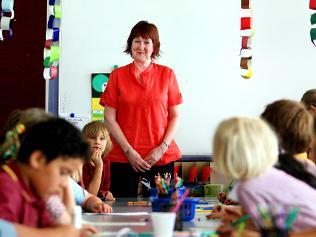Schools in Education Minister's seat could do better
ONLY one school out of 32 government primary and secondary schools in the Education Minister's electorate has outperformed its peers

ONLY one school out of 32 government primary and secondary schools in Education Minister Julia Gillard's electorate has exceeded expectations and outperformed its peers in student learning.
Statistics that combine national literacy and numeracy results, teacher assessments, socio-economic status and use them to compare the performance of different schools also reveal six schools in Ms Gillard's Victorian electorate are performing below expectation.
The data shows that just one school -- Coburn Primary School -- scored a "higher" rather than "similar" or "lower" in student performance when compared with other schools in the state.
Ms Gillard's electorate of Lalor takes in the western suburbs of Melbourne and the bulk of the government schools are classed as having either a low or mid to low socio-economic profile, which is calculated on the income of the students' families.
The first Victorian School Performance Summary 2009 shows that 25 schools in Lalor were ranked "similar" for their student learning and six schools were ranked "lower" in academic performance when compared with other schools.
The statistics also showed only one school -- Point Cook Primary -- had a high socio-economic profile but it also was one of the six schools ranked "lower" in student performance when compared with other schools. The principal at Point Cook Primary School, Michael Hayes, told The Australian his school was closing at the end of the year and was relocating to become a new Prep-to-Year 9 college.
"We are quite comfortable with our results and I don't want to talk to you about them," he said.
Coburn Primary School principal Rhonda Knight credited the school's success to setting high goals.
"I have been at the school for seven years and I place high expectation on my parents, teachers and students," she said.
"It's having a whole-school approach, having high-quality teachers who are role models and leaders," she said.
Ms Knight said the school also used data from literacy and numerical tests to identify underperforming students and set up improvement plans to "make it happen for that child".
Ms Gillard said her government's agenda was about ensuring the community could see how schools were going and what needed to be done to address underperformance.
"There is no reason why kids in my electorate, in Melbourne's west, cannot do as well in literacy and numeracy as kids in other parts of Australia," she said. Ms Gillard said she was confident "Melbourne's fighting west" was up to that task.
"What would be worse is if we never knew which schools were struggling to teach these fundamental skills," she said.


